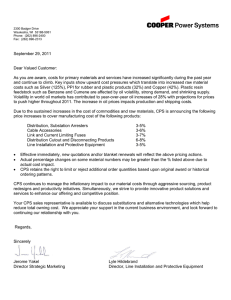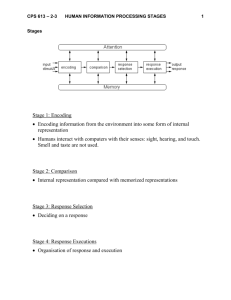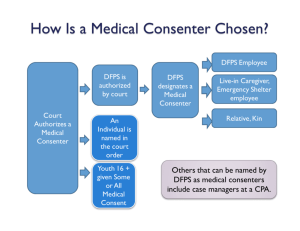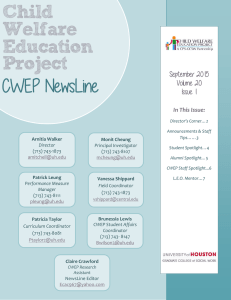CWEP NewsLine September 2014 Volume 19 Issue 1
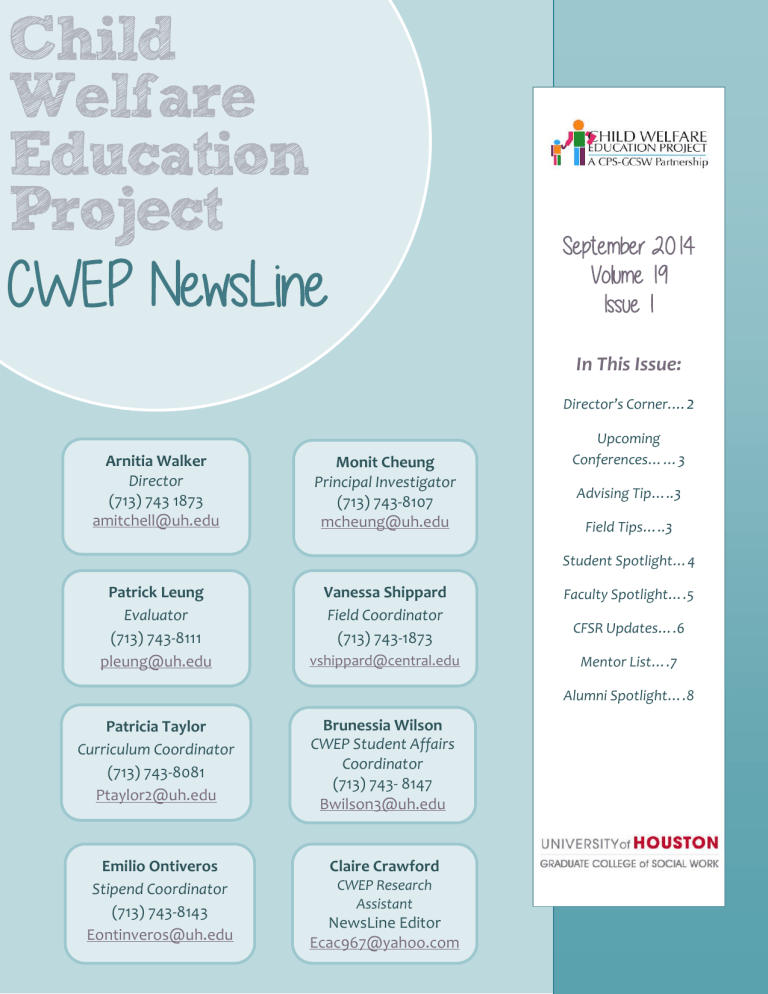
CWEP NewsLine
Arnitia Walker
Director
(713) 743 1873 amitchell@uh.edu
Patrick Leung
Evaluator
(713) 743-8111 pleung@uh.edu
Patricia Taylor
Curriculum Coordinator
(713) 743-8081
Ptaylor2@uh.edu
Emilio Ontiveros
Stipend Coordinator
(713) 743-8143
Eontinveros@uh.edu
Monit Cheung
Principal Investigator
(713) 743-8107 mcheung@uh.edu
Vanessa Shippard
Field Coordinator
(713) 743-1873 vshippard@central.edu
Brunessia Wilson
CWEP Student Affairs
Coordinator
(713) 743- 8147
Bwilson3@uh.edu
Claire Crawford
CWEP Research
Assistant
NewsLine Editor
Ecac967@yahoo.com
September 2014
Volume 19
Issue 1
In This Issue:
Director’s Corner.… 2
Upcoming
Conferences……3
Advising Tip…..3
Field Tips…..3
Student Spotlight…4
Faculty Spotlight….5
CFSR Updates….6
Mentor List….7
Alumni Spotlight….8
Director ’ s Corner
Arnitia Walker
Welcome back to our current and incoming CWEP Students!!
This semester begins the 16 th
year for CWEP. We are all excited to begin a new year and are working on new projects.
On August 1, 2014 CWEP students participated in the annual CWEP
Student Orientation held at Youth Services Center, 6300 Chimney Rock Road.
The Orientation included welcoming and introductory remarks from Arnitia Walker, the Director of CWEP, Dr. Monit Cheung, Principal Investigator, Scott Dixon, CPS Regional
Director, Region 6 (Outlying Counties) and CJ Broussard, CPS Regional Director, Region 6
(Harris County). Lindy Levit, CPS Region 6 ROSA provided the students with information as it relates to their employment both during and after the CWEP program. Emilio Ontiveros,
Stipend Coordinator, informed the students about the stipend process. Brunessia Lewis,
Student Affairs Coordinator, discussed student advising. Vanessa Shippard, Field
Coordinator, discussed field placements with the students.
The 2014-2015 CWEP mentors were introduced to the students as well.
They include former students all who are former CWEP students have committed to serving as resources for the students during the school year. The mentors are: Catheryn Ramirez, Alma Carrillo,
Jamelle Gibbs, Lashawn Roberts-Deckard, Dalen Dilieto,
Gwen Carter and Erica Figueroa (see p.7 for their contact
Information).
Page 2
Upcoming Conferences
NASW Texas State Conference
October 18-20
San Marcos, TX
Website: http://www.naswtx.org/?page=Conference
CSWE Annual Program Meeting
October 23-26
Tampa, FL
Website: http://www.cswe.org/Meetings/2014APM/70051.aspx
Advising Tip
Brunessia Wilson
Field Tips
Vanessa Shippard
Always check your financial aid to ensure accuracy!
Familiarize yourself about the origin and motto of the company
Use good communication skills
Be able to quickly adapt to changes
Take handwritten notes
Ask questions when not clear
Keep a journal with questions, meeting dates and field hours
Page 3
Student Spotlight
Yolette Sneed
1. What is your current job position (if you are working at CPS)?
Or, tell us about yourself.
I have been employed with the Department of Child Protective
Services in Harris County for the past 13 years. I have worked as an
Yolette Sneed
Advanced Child Care Licensing Specialist and is currently working as a
Foster/Adoption Specialist, IV. I am a 2000 graduate of Prairie View A & M
University with a B.S. degree in Health with a Minor in Social Work. In 2002, I obtained a Masters of Arts degree in Educational Leadership and Counseling from Prairie View A & M
University.
2. What motivated you to join the MSW program?
What motivated me to join the MSW program was influenced and encouraged by my past experiences as a substitute teacher while in undergraduate studies and working with children and families as a Child Care
Licensing Advanced Specialist and a CPS Foster/Adoption Development Specialist, IV in the social work area.
These experiences helped to fuel my desire to continue to help my community and families in need.
The skills and knowledge I have obtained and continue to obtain through social service work has helped me to become a productive employee, student and a social work professional. My daily experiences in working to meet the needs of families has truly provided me with a sense of self-wealth, a strong emotional bond to social work and feelings of belonging. The Graduate College of Social Work (GCSW) is a good place for me to continue to build on the social work skills that I have obtained. The Master of Social Work (MSW) program will help me expand my knowledge with current methods, literature, research, laws and practices in the area of social work.
3. Tell us about your achievements in child welfare.
My achievements in child welfare have been many. I have been awarded the opportunity to receive a scholarship through the Child Welfare Education Program to continue my education to work toward receiving a second master’s degree. Because of my knowledge and experience, I am a mentor for the department and my designated unit. I am the lead worker for my unit as well as the worker in charge in my supervisor’s absence. As a certified PRIDE (Parent Resource for Information, Development and Education) trainer for the
Houston region, I have trained potential foster and/or adoptive families how to care, help, nurture and assist children in the foster care system.
4. Other comments:
I am highly engaged in public service work through my many organizations; Delta Sigma Theta Sorority,
African American Culture Society, Knights of Peter Claver Ladies Auxiliary, Phi Delta Kappa, Chi Sigma Iota and my local church. I thrive on being able to make a difference in the welfare fair of my country, community, family and those deprived of their human rights.
Page 4
Staff Spotlight
Emilio Ontiveros
1. What is your current position with CWEP or CPS? How long have you been working in this position? What prior experience(s) did you bring with you to this position?
I recently graduated last December, therefore was promoted within CWEP. I am currently the stipend coordinator. I prepare and submit the student stipend/scholarship documents to the UH Scholarship and Financial Aid Office. Previously I was support staff for the Child Welfare Education Program.
2. What have been the greatest rewards working in the CWEP or CPS family?
As a former undergrad student and scholarship recipient, I understand the importance of scholarship monies and I try to do everything within my power to make sure the stipends are disbursed in a timely manner to the students. It’s always nice to hear that the money has hit each and every student’s account. The way I see it – it’s one huge less worry for the semester.
3. What advice do you have for our CWEP students?
Well in regards to my position here - always stay on top of your student status and your accounts. Please make sure all of your information is the most recent and up to date.
Feel free to contact me directly if and whenever you need to. Enjoy your semester!
Page 5
Child and Family Services Reviews
Third Round Criteria Updates
According to the Child and Family Services Review website ( https://cbexpress.acf.hhs.gov
), CFSR has applied feedback from the field this year to update and improve its review system. The changes, which will officially begin in Spring 2015, will still serve the CFSR’s primary goals of: 1) Determining state conformity with child welfare requirements; 2) Determining the experience of children and families within the child welfare system; and 3) Supporting states to enhance their capacity to provide better outcomes and systems for children and families. The following are changes in CFSR criteria:
1. Statewide Assessment and Integration with the Child and Family Services Plan ( CFSP )
Previously, the Children’s Bureau (CB) has required each state to assess its functioning within state and national standards separately. Following complaints from states about the long and burdensome process of writing evaluative narratives in addition to providing data to verify compliance with national standards, the CB has modified the monitoring process to better integrate state assessment and the five-year CFSP. The narrative process will be eliminated, and the CB instead will rely on what it believes will be more robust and accurate data from states’ reported data as they monitor and assess their progress. Additionally, states can simply update their plans when necessary.
2. Onsite Reviews — Stakeholder Interviews and Case Reviews
The CB is making changes to the onsite review process in two domains: stakeholder interviews and case reviews. In part, this modification reflects the need to move from a one-week, episodic review process by the CB to an ongoing, continuous review that the CB approves and oversees. The CB will no longer interview an extensive list of stakeholders during one-week review periods due to concerns about the subjective and variable nature of stakeholders’ feedback. Instead, interviews will be conducted only when state conformity to national standards is unclear and data reports provide insufficient state self-evaluations.
In terms of modifications to case reviews, states will now review their own cases on an ongoing basis with CB’s approval. States will use a federal review instrument with specified sampling method that will ensure accurate and consistent case review processes. If states do not meet the CB’s standards, they are given the option to improve their review processes or conduct the traditional one-week case review. This change was created to encourage states’ institutional capacity while maintaining conformity.
3. Statewide Data Indicators and National Standards
Finally, new data indicators will be enacted while maintaining adherence to national standards. The
Data Indicators were and are based on data available from states’ Adoption and Foster Care Analysis and Reporting System and National Child Abuse and Neglect Data system. Permanency data indicators will now be based on entry cohorts rather than exit cohorts, composite measures will no longer be used, and conformity will be increased in the implementation of safety measures.
Page 6
CWEP Mentors
Name
Graduation
Date
Catheryn Rameriz MSW
Cathryn.ramirez@dfps.state.tx.us
713-516-7717 (personal) 713-394-4355 (office)
May 2010
Clinical
Alma Carrillo MSW alma.carrillo@dfps.state.tx.us
832-454-7254 OR 832-329-4831
Jamelle Gibbs MSW jamelle.gibbs@dfps.state.tx.us OR meltgibbs@gmail.com
832-725-4354
Lashawn Roberts-Deckard LMSW lashawn.roberts@dfps.state.tx.us
713-478-2332
May 2012
May 2013
May 2008
Children and
Families
Dalen Dilieto dalen.dilieto@dfps.state.tx.us
713- 394-4279
Gwen Carter LMSW
Gwen.Carter@dfps.state.tx.us
979-480-7663
May 2013
Clinical
2004
Children and
Families
Erica Figueroa MSW
Erica.figueroa@dfps.state.tx.us
832-217-5718
2007
Children and
Families
Page 7
12
4
Years at
CPS
Position
FAD Worker IV - Region 6
Certified Trainer
7 Kinship Supervisor
7
18
22
29
Subcare
CPS Permanency Care
Assistance Negotiator
(Program Spec. III)
Adoption Prep Supervisor
Media Specialist for
CPS/APS/CCL
(Speciality-FAD)
Kinship Supervisor
Alumni Spotlight
Gwen Carter
1. What was your experience when you were
attending the Graduate College of Social Work? Everyone at the
Graduate College of Social Work was so supportive of me all through my journey. The atmosphere made me very comfortable to
share my life and work experiences with my classmates and the professors.
I learned so much about the origins of Social Work and the practice and a lot about myself. I know that these things make me a better Social Worker. The experience of being at the Graduate College of
Social Work is one I will never forget.
2. What are some of the ways in which you have been involved with CWEP over the years?
I have continued to attend trainings whenever possible. I have also had the opportunity to speak to groups of CWEP students and I am currently serving as a mentor. I also serve on the CWEP Evaluation
Committee Meeting.
3. What do you think have been some of the important changes in the CWEP program over the years?
I think the program has become more flexible in working with students. I think the most important thing is the continued responsiveness to students.
4. Please describe your current position and some of the challenges you find in your work.
I am currently a Media Specialist for the Department of Family and Protective Services, Child Protective
Services, Adult Protective Services and Child Care Licensing. One of the many challenges I face is explaining what we do as an agency to the general public. There are a great many misconceptions about the role of agency in dealing with children, families and adults.
5. What do you feel are some of the most important rewards in your work?
I think of my work as bridging the gap between the community/general public and our agency.
6. What advice do you have for current CWEP students?
I would advise all of the students to take full advantage of the support they are provided and of the opportunity. This is a once in a lifetime opportunity to gain a world class education while continuing to serve children and families. I would also encourage the students to enjoy the atmosphere and unity that is a part of CWEP.
Page 8
